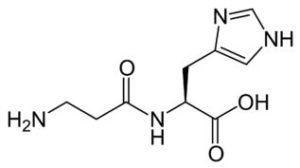Table of Contents
L-Carnosine (β-alanyl-L-histidine) is a natural histidine containing dipeptide amino acid and the other being beta-alanine. Carnosine is found throughout your body. The highest concentrations are in high energy demand areas such as your brain, heart and muscles.
L-Carnosine is known as the ‘longevity molecule’. But don’t let that put you off if you’re not concerned about anti-aging. Carnosine levels decrease with age – starting at age 10! And decrease by 63% by the time you reach 70 years.[i]
L-Carnosine is one of the most powerful antioxidants known. It’s a heavy-metal scavenger. It’s a super auto-regulator. And it stands alone when it comes to preventing and reversing advanced glycation end products (AGEs) and cross-linking. And it’s highly concentrated in your brain.
Your brain uses l-carnosine to repair tissue and clear away toxins. And increase the energy output of your mitochondria. It suppresses excess immune responses when your immune system is in hyper mode. And it stimulates the immune response if you have a weakened immune system.
L-Carnosine helps:
- Neuro-repair: L-Carnosine prevents and reverses the damage done by advanced glycation end products (AGEs). AGEs are created in your brain by sugars binding to amino acids, and caused by a variety of things including certain food and cooking techniques. Affecting word recall, response time, and cognition.
- Brain Energy: L-Carnosine can revive mitochondria. And even rescue your brain cells if the mitochondria have stopped functioning.
- Neuroprotectant: L-Carnosine has a powerful antioxidant effect in your brain. It continues to prevent oxidative damage even after brain cells have been attacked by free radicals. Preventing brain cell death and neurodegenerative disorders like Alzheimer’s and Parkinson’s.
What is L-Carnosine?

L-Carnosine (β-alanyl-L-histidine) is a dipeptide of the amino acids beta-alanine and histidine. Carnosine is found throughout your body. The highest concentrations are in high energy demand areas such as your brain, heart and muscles. (Don’t mistake l-carnosine for l-carnitine).
L-Carnosine is known as the ‘longevity molecule’ and targets several major processes in your brain and body. It removes heavy metals which accumulate in, and damage brain cells causing diseases like Alzheimer’s.[ii] And it prevents cross-linking of proteins which cause the neurofibrillary tangles found in Alzheimer’s.[iii]
L-Carnosine fights mitochondrial dysfunction by relieving oxidative stress caused by accumulation of free radicals in cells.[iv]
This not only works in your brain cells. L-Carnosine is used by athletes to achieve better results. Its buffering nature contributes to the acid-base balance in muscles.
Researchers have found l-carnosine restores neurotransmitter receptors. Receptors that were damaged from stroke or glutamate toxicity.[v]
And l-carnosine reduces damage to telomeres. These caps on the end of DNA strands shorten with each cell replication. This natural, ongoing process is used for example in long-term potentiation needed to form memories. L-carnosine slows the rate of shortening of telomeres.[vi]
Some l-carnosine is naturally produced in your body by the enzyme carnosine synthetase. And you can get l-carnosine from food – primarily from red meat and poultry. But a typical meal provides only about 250 mg of carnosine. It’s then quickly degraded in your body by the carnosinase enzyme.
This means carnosine from food doesn’t last long enough in your body to provide much benefit. And if you’re a vegetarian, you won’t be getting much carnosine other than what’s naturally produced in your body.
Supplementing with at least 1,000 mg of l-carnosine per day overwhelms that carnosinase enzyme. Allowing you to maintain consistent blood levels of this vital nutrient.
How does L-Carnosine Work in the Brain?
L-Carnosine boosts brain health and function in several ways. But two in particular stand out.
- L-Carnosine is critical for brain health. L-Carnosine’s antioxidant, neuroprotective, chelating, and anti-glycation activity not only maintains optimal brain health. This dipeptide can be used to prevent and treat neurodegenerative diseases, diabetes, diseases of the sense organs (i.e. eyes) and cancer.[vii]
L-Carnosine has been shown to reduce oxidative and glycemic stress.[viii] And it reduces inflammation. L-carnosine reduces the accumulation of b-amyloid plaque which plays a role in cognitive dysfunction and Alzheimer’s. And it helps remove heavy metals that cross the blood-brain barrier and accumulate in brain cells.[ix]
- L-Carnosine is required for healthy mitochondria. In your brain, you can have thousands of mitochondria in each cell. And they pump out energy in the form of ATP (adenosine triphosphate). 20% of your body’s total ATP is located in your brain.
Glycation during this energy production reduces the functionality and efficiency of mitochondria. This is turn can cause apoptosis (cell death).[x] Glycation happens when proteins or DNA bond chemically to sugar molecules.
These sugar molecules go on to form advanced glycation end products (AGEs). These AGEs are implicated in Alzheimer’s, skin wrinkles, hardened arteries, and reducing the function of most major organs. Including your brain.
A study in the Netherland was done to examine the association between AGEs and cognitive function. This population-based study also included 215 people with type 2 diabetes.
Researchers tested for global cognitive functioning, information processing speed, verbal memory (immediate and delayed word recall), and response inhibition.
The study found there was a direct correlation with markers measured for AGEs and decreased cognitive performance. And the associations were no different between healthy people and those with diabetes.[xi]
Another study out of the University of California determined that l-carnosine was able to prevent AGEs.[xii]
How things go bad
Free electrons are a byproduct of ATP energy production. These electrons convert oxygen to a highly reactive form capable of damaging brain cells. And wreaking havoc with DNA in the long-term.
If left unchecked, it leads to neurodegenerative disease like memory loss, cognition dysfunction, and eventually diseases like Alzheimer’s.
↓ ATP levels decline in mitochondria
↓ Cognition, learning, memory and recall decline
↓ AGEs damage brain cells
↓ Free radicals damage brain cell mitochondria
All of these changes can happen at any age. And can start at age 10 or earlier (in the case of autism).
So l-carnosine supplementation can help for age-related cognitive decline, as well as anyone who wants to boost cognition, learning, recall and memory.
L-Carnosine benefits
There is a proven high correlation between human lifespan and l-carnosine levels. Having high levels of skeletal muscle carnosine contributes to a number of life-extending activities. As L-Carnosine is highly concentrated in your muscles and brain.
L-Carnosine helps prevent the buildup of advanced glycation end products (AGEs) that damage mitochondria. And eventually end in premature cell death.
It is a heavy metal chelator and works by removing heavy metal accumulation in brain cells. L-carnosine is an anti-oxidant and pH buffer in muscle cells preventing lactic acid buildup.
How does L-Carnosine feel?
When you start taking L-Carnosine, you’ll notice younger-looking skin. And you’ll have more energy.
 You should experience a boost in cognition and decision-making capability. Thinking could be more fluid and your motivation may see a boost.
You should experience a boost in cognition and decision-making capability. Thinking could be more fluid and your motivation may see a boost.
These changes are reported by neurohackers in their 20’s and 30’s as well as the more senior user.
But most of the talk and research on l-carnosine is on its anti-aging and longevity benefits. So what if I told you it also helps fight the flu?
It turns out that the influenza virus raises nitric oxide (NO) and oxygen free radicals such as superoxide anion (O₂⁻˙). When NO and O2– interact, they form peroxynitrite, the pathogen that causes pneumonia.
The excess amount of toxicity and oxygen radicals generated overwhelms your immune system. A study in the American Journal of Therapeutics reports that l-carnosine can put a stop to this overwhelm. And help you avoid or get rid of the flu or cold.
And eating chicken soup to make you feel better when your sick is not an ‘old wife’s tale’ after all. Chicken soup is rich in l-carnosine.[xiii]
L-Carnosine Clinical Research
L-Carnosine improves cognition
Animal and human studies suggest NMDA antagonists worsen executive function. This dysfunction is often caused by glutamate toxicity. And if this persists, you end up with diseases like schizophrenia.
This double-blind, placebo-controlled study worked with 75 adults with schizophrenia. They were stable in their symptoms at the time of the study. Subjects were randomly selected to receive 2 grams of l-carnosine per day for 3 months.
Executive dysfunction, memory, attention and motor speed were assessed at the beginning, and at 4 and 12 weeks. The l-carnosine group performed much better in executive function tests. And were better at strategy with fewer errors than the placebo group.[xiv]
L-Carnosine improves autism symptoms in children
L-Carnosine enhances frontal lobe function in your brain. And acts as a neuroprotectant. It also works with GABA for an anticonvulsive effect.
This double-blind study work with 31 children with autism for 8 weeks. They were given 800 mg of l-carnosine per day. The scientists then used several autism rating scales to measure results.
After 8 weeks of l-carnosine use, the children showed significant improvement in behavior, sociability, communication and vocabulary. The researchers concluded that l-carnosine enhanced neurologic function.[xv]
L-Carnosine is anti-aging
In 1965, Dr. Leonard Hayflick found that human cells have a limited capacity to divide. After which they become ‘senescent’. This is now known as the “Hayflick Limit”.
 Hayflick discovered that your cells go through 3 phases. This first is rapid cell division called ‘mitosis’. The 2nd is where mitosis slows. And the 3rd stage is ‘senescence’ where the cell stops dividing entirely. They remain alive for a while and then do a particularly disturbing thing. They commit suicide. This programmed cell death is called ‘apoptosis’.
Hayflick discovered that your cells go through 3 phases. This first is rapid cell division called ‘mitosis’. The 2nd is where mitosis slows. And the 3rd stage is ‘senescence’ where the cell stops dividing entirely. They remain alive for a while and then do a particularly disturbing thing. They commit suicide. This programmed cell death is called ‘apoptosis’.
This cell life cycle occurs throughout your body and its trillions of cells. Including in your brain. But what if there was some way to slow down this programmed cell death?
Turns out there is. And it’s called L-Carnosine. Researchers at Sydney Laboratory in Australia found that l-carnosine extended cell life. They put cultured aged human cells in a petri dish with carnosine. The cells reverted back to juvenile cells.
When they put those same newly rejuvenated cells in a culture that had no carnosine, they reverted back to their old self again. Put them back in carnosine and they got young again.[xvi]
This experiment has been done again and again in labs around the world. Establishing l-carnosine as the best anti-aging thing since Ponce de Leon was searching for the Fountain of Youth right here in Florida (where I’m writing this article).
David Guetta thinks that Miami is “the sexiest city in the world”. Could be that everybody in Miami is using l-carnosine.
L-Carnosine Recommended Dosage
Recommended L-Carnosine dosage is up to 1,000 mg per day.
To keep a consistent level of L-Carnosine in your body, split your dose into two 500 mg doses. One in the morning and one later in the afternoon.
One important note on L-Carnosine. When you supplement with L-Carnosine it binds to aldehydes. Preventing them from making proteins. The byproduct is lipofuscin. This age pigment is not dangerous. But shows up as brown spots on your brain, skin and other organs.
As lipofuscin builds up over time, and this process is accelerated when using l-carnosine, it can interfere with proper organ and cellular functions.
This is why I recommend stacking L-Carnosine with CDP-Choline (Citicoline) and acetyl-L-carnitine (ALCAR). CDP-Choline provides a choline molecule for the synthesis of acetylcholine (ACh). And ALCAR works as a cofactor in this synthesis as well as boosting mitochondrial energy production while acting as a neuroprotectant.
You can also try adding DMAE with CDP-Choline and ALCAR which helps flush lipofuscin from your brain and body. So stack your daily dose of 1,000 mg of L-Carnosine with CDP-Choline, DMAE and ALCAR at their recommended doses.
L-Carnosine is water-soluble so you don’t need to take it with a meal, or healthy fat like some nootropics.
L-Carnosine Side Effects
Carnosine is considered an extremely non-toxic and safe. High doses can cause insomnia. And L-Carnosine can cause a stimulant effect. So take your 2nd dose before evening.
Type of L-Carnosine to Buy
L-Carnosine comes in powder, capsule, tablet and liquid form.
Most major supplement manufacturers offer 500 mg tablets or capsules.
But make sure you read the labels and get pure L-Carnosine. Avoid toxic “other ingredients” such as magnesium stearate and silicon dioxide.
Nootropics Expert Recommendation
L-Carnosine 1,000 mg per day
 I recommend using L-Carnosine as a nootropic supplement.
I recommend using L-Carnosine as a nootropic supplement.
Your body does make some L-Carnosine on its own from the amino acids beta-alanine and histidine. And you can get small quantities from red meat and poultry. But it’s easily and quickly broken down by the enzyme carnosine synthetase.
So to get its benefits, and enough to overwhelm the carnosinase enzyme, you must take it as a supplement.
L-Carnosine is especially helpful for repairing brain cells at the mitochondria level. It removes heavy metals, works as a very powerful antioxidant, and gets rid of AGEs.
Advanced glycation end products (AGEs) kill brain cells. Foods that are high in AGEs include roasted, fried, sautéed and barbecued meats, nuts and tofu. Those fries you had for lunch? Brain cell death.
Your natural production of L-Carnosine starts to drop at age 10. So anyone will benefit from supplementing with this anti-aging nutrient.
L-Carnosine helps control blood glucose levels, prevent Alzheimer’s, wound healing, protects from the side effects of chemo therapy, alcohol-induced liver damage, combatting heart disease, and eye health by protecting or repairing cataracts.
L-Carnosine is also particularly useful if you’re dealing with autism or Alzheimer’s. For autism, dose up to 800 mg per day. For Alzheimer’s, dose at least 1,000 mg per day.
And don’t forget to stack your daily L-Carnosine dose with DMAE and ALCAR. (See Dosage Notes)








Join The Discussion - 164 comments
Mari
August 28, 2025
It seems that to raise L-Carnosine level in muscle and brain, beta alanine might be more bioavailable and more economical option than L-carnosine, which breaks down to beta alanine and Histidine in GI before they combine back to L-Carnitine where it’s needed?
David Tomen
August 29, 2025
Mari, L-Carnosine is a dipeptide composed of the amino acids beta-alanine and histidine. You could use beta-alanine to increase L-Carnosine in your system as long as you had enough histidine available.
Shaheer
February 17, 2025
Whats the difference or pro/cons between N-Acetyl L-Carnosine (NALC) and L-Carnosine for oral supplementation?
David Tomen
February 19, 2025
Shaheer, Acetyl groups are often added to a supplement to increase bioavailability. But you do not need to do that with L-Carnosine because it is already highly bioavailable.